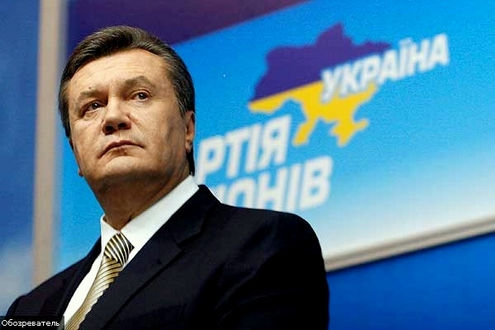
The U.S. bets on the presidential elections in Ukraine
The Republican Party representatives insist on the toughest sanctions against the Ukrainian authorities. The Congress is about to receive a draft resolution which (according to the media sources) has a direct request to Victor Yanukovych to release Yulia Tymoshenko and the members of her government. Kiev hopes that in the end the resolution will be softened and Washington, as well as Brussels, will hold out on conclusions until the parliamentary elections in Ukraine.
The Organization for Security and Co-operation in Europe, which monitors Helsinki’s accords, is behind this tough resolution. The OSCE includes nine representatives from the U.S. Congress and also one representative from the Department of State, Trade and Defense. In October last year, the U.S. commission was the one to come up with the toughest statement when it announced the verdict to the Ukrainian former prime minister. While the EU officials expressed their concerns with the situation in a diplomatic manner, the U.S. made a direct statement. “The politically motivated conviction of Yulia Tymoshenko starkly illustrates the crisis of democracy in Ukraine. Her persecution and the verdict on her case question Ukraine’s commitment to human rights, democracy and rule of law advocated by the OSCE. This situation also raises serious doubts on the Ukraine’s suitability to assume the Chairmanship of the OSCE in 2013.”
Half a year later, the U.S. Republican Party Sen. James Inhofe sent a new draft resolution to the International Relations Committee with a request to the Ukrainian authorities to immediately release Tymoshenko based on her medical statements. Otherwise, the U.S Congress was supposed to put a ban on granting U.S. visas to all Ukrainian politicians and officials involved in prosecuting opposition leaders. Besides that there was a suggestion to return the U.S. ambassador from Kiev and to discontinue embassy’s work until the Ukrainian officials will not cease the practice of “selective justice.” The OSCE was supposed to cancel Ukraine’s chairmanship in 2013, and NATO to stop all cooperation programs with Ukraine.
The other day, another Republican and Co-Chairman of Helsinki’s Commission, Christopher Smith, said that the demands to the Ukrainian authorities are reasonable. The Congress might soon need to adopt a resolution with an ultimatum to the Yanukovych team: either an immediate release of Tymoshenko or sanctions. A former U.S. ambassador to Ukraine and currently a leading expert of The Brookings Institution on the United States and Europe, Steven Pifer said to Radio “Svoboda” that the U.S. can truly go from talks to actions. “I was really surprised that none of the senators and Congressmen opposed Sen. James Inhofe’s resolution calling for serious political sanctions against the Ukrainian leadership. In fact it confirms Washington’s certainty in minimizing democracy in Ukraine. By the way, the U.S. senators considered the draft resolution after the discussions regarding the sanctions against the Russian officials and judges, related to the Magnitsky’s case. I do not exclude that in case of worsening the situation in Ukraine; the U.S. Congress will raise again the question of sanctions against Ukraine.”
Noteworthy, that especially now 257 members of the NATO’s Parliamentary Assembly sent their request to the Ukrainian authorities to release the opposition leaders. NATO’s Secretary General Anders Fogh Rassmussen made a statement in Brussels confirming “politically-motivated prosecutions of the opposition leaders in Ukraine.” He acknowledged that this was one of the reasons of canceling an earlier planned NATO’s visit to Kiev this summer.
Kiev admits that the pressure on Ukraine is growing from the U.S. and all the international organizations that Washington influences. “An anti-Ukrainian campaign is primarily connected to the presidential elections in the U.S. The Republicans, making strong political statements aim not so much at our Yanukovych, as at their Obama — a ‘dove’ and a soft politics advocate,” said an expert of The Institute of the Ukrainian Politics, Aleksey Poltorakov. He thinks that the U.S. game will be played in the political area and not going to the right field “just because de jure it borders with the interference in the internal affairs of the sovereign state of Ukraine.” Besides that, the expert is sure that in regards to the external politics in Europe, Washington will coordinate their actions with EU, which is not interested in Ukraine’s isolation and pushing it to drifting to Russia’s side.
The analyst of the Institute of Euro-Atlantic Cooperation, Vladimir Gorbach, stressed the particular aspect of this situation: “The Republicans’ views in regard to Ukraine agree with the Europeans’ now, and what is especially unique with Russia’s position as well. All Ukraine’s partners consider Tymoshenko and her team detention politically motivated. Everybody is waiting for the parliamentary elections in October, which results can become a starting point for a new politics towards Ukraine. Besides, if earlier Russia played together with the CIS neighbors in cases when the West had doubts about elections’ democracy level, now it is likely that the views will agree.” After that a total political isolation of the Yanukovych’s team is not excluded, says the analyst.
Gorbach thinks that neither the West nor Russia expects any sensations from the current Ukrainian authorities; and by the end of the year they will start looking closely at the potential candidates for the 2015 presidential elections. From that time on a real struggle for Ukraine will be renewed, in which the U.S. will support Europe against Russia. “The most unexpected twists are possible including early presidential elections,” says the analyst. However, a lot will depend on who will win in the presidential elections in the U.S. “The Democrats demonstrated that they have enough ‘foreign affairs headache’ without Ukraine. The European direction for them is not on the first place. The situation here is given to the EU, where Germany plays a more and more important role and has recently strengthened partnership relations with Russia.”

Leave a Reply
You must be logged in to post a comment.